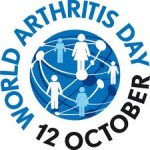
Psoriatic arthritis
The Simple Tasks Campaign – take action!

Earlier this month, the Simple Tasks Campaign launched its efforts to raise awareness about the value of rheumatology services.
It’s come about because about 1 million people in the UK have rheumatology conditions but many key decision makers do not understand the scale and severity of the conditions, and do not have enough information about what rheumatology services can offer patients. Continue reading
Heart attack and stroke risk is double for people with gout
Gout doubles the risk of heart attack and stroke, says research published in Rheumatology.
A large study tracked the health of over 205,000 people with gout using data spanning 50 years. Analysis of the data showed that those with gout are twice as likely to have a heart attack or stroke then those without gout. Continue reading
Treatment hope for knee cartilage issues
A new material could one day offer a solution for people who need knee cartilage treatment.
Knee cartilage needs to be placed under stress so it can regenerate, as happens when we take a step and our knees take our weight. At this moment they are the most receptive to medication.
Experts have developed a smart material that only releases a substance when the material is under stress. Continue reading
World Arthritis Day: Saturday 12th October
 Tomorrow – the 12th October – is World Arthritis Day and it’s not too late to get involved.
Tomorrow – the 12th October – is World Arthritis Day and it’s not too late to get involved.
This year’s topic is healthy ageing for people with rheumatic and musculoskeletal diseases, and events are happening all over the world.
Vision 2043, a new international competition, invites people to submit creative ideas, innovations or grand plans that could help transform the lives of people with rheumatic and musculoskeletal diseases and make the world more inclusive.
To find out more on the competition and for a list of what’s going on where, visit www.worldarthritisday.org.
Special effects used to fight arthritis
A virtual reality centre that includes equipment used to create special effects in films has been set up at Cardiff University to monitor how joints are moving.
The £500,000 investment includes cameras, a cinema screen and computers that enable experts to examine the movement of people with arthritis and other limb problems.
The first project is the analysis of a group of people with knee injuries who are each fitted with infra-red sensors and asked to take part in various exercises. The researchers then build a digital picture of the way each joint is performing and will then develop new rehabilitation tools to ease knee joint problems. Continue reading
